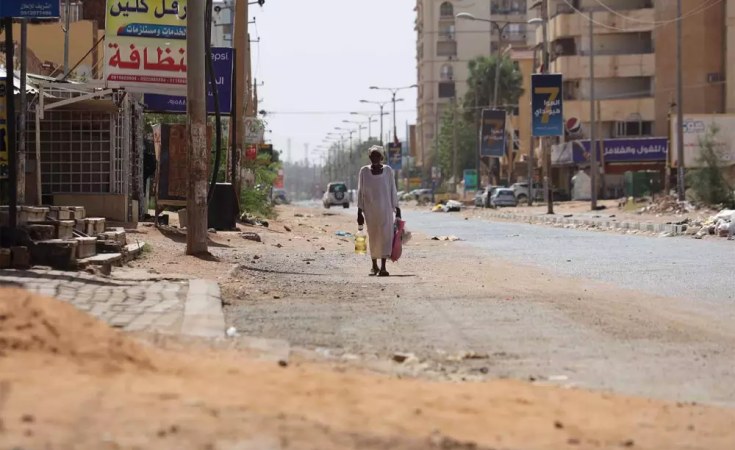'The UN Security Council cannot continue to ignore its responsibility to protect civilians.'
In the deafening silence of global indifference, the war in Sudan recently entered its 10-month mark.
Since April 2023, close to 8 million people have fled their homes, of whom more than 1.6 million have sought refuge in Chad, South Sudan, Egypt, Ethiopia, and the Central African Republic - countries already grappling with immense difficulties.
Close to 25 million people need humanitarian assistance, including around 5 million people on the brink of famine and nearly 7 million children who are severely undernourished. Mass graves conceal evidence of widespread, systematic, and targeted mass atrocities that could be repeated at any moment as the conflict further expands.
Yet despite all of this, Sudan remains seemingly invisible to the global community.
The UN Security Council, other key multilateral institutions like the African Union, the Intergovernmental Authority on Development (IGAD), and states with influence over the warring parties have failed to stop the violence.
And while the UN Security Council does little beyond condemn attacks on civilians and call for access to humanitarian assistance, regional efforts to resolve the crisis have been grindingly slow and too tepid.
As a result, commitments from the Sudanese Armed Forces and Rapid Support Forces to protect civilians and facilitate the delivery of humanitarian assistance remain unfulfilled. Those with influence over the warring parties have echoed hollow calls for ceasefires and looked away as cumbersome bureaucratic requirements hinder our aid efforts.
A worsening crisis
Their lives turned upside down, Sudanese civilians have shown extraordinary strength. They have forged local mutual aid networks, channelling tireless efforts into collecting food, cash, and medicine to aid those in dire need. They have demonstrated that assisting Sudan's most impacted regions is difficult but far from impossible.
Yet despite these efforts, the humanitarian situation is still worsening.
Sudan now has the grim honour of being the world's largest child displacement crisis, with more than 3 million children - from a population of about 23 million children - displaced by violence since mid-April last year.
Today, fighting has engulfed more than half of the country. The capital Khartoum is now a ghost city, haunted by the smell of decaying bodies left in the streets. The normally quiet neighbourhoods have become battlefields, where homes, hospitals, schools, and markets have been bombed, looted, and occupied. In southern Sudan, the towns of Kordofan are strangled as fighting has cut supply lines and roads.
In December, Al-Jazirah state, once the country's breadbasket, witnessed intense fighting leading to a new wave of displacement, as more than half of a million people fled their homes in search of safety. The state had recently become a hub for humanitarian operations, including our own, and fighting has forced us to relocate our staff and pause our operations in the state.
Further west, in Darfur, ethnicity has determined life or death. The generation born during the 2003-2005 genocide has followed their parents' desperate exodus. More than 600,000 people have now fled into neighbouring Chad; thousands never made it, having been executed in their homes or on the way.
What should be done?
At the end of February, the UN Security Council will close its political mission to Sudan, at a time when its responsibility to the country's population is greater than ever.
To allow humanitarian organisations to reach the Sudanese people, we need the UN Security Council to demand unfettered humanitarian access across Sudan. The Council should act to pass a Resolution calling for all parties to the conflict to uphold their obligations under International Humanitarian Law and International Human Rights Law, including the duty to protect civilians and the critical infrastructure they rely upon. This includes taking all feasible precautions to prevent grave violations against children and any forms of sexual and gender-based violence. The UN Security Council cannot continue to ignore its responsibility to protect civilians.
To those who have been left wounded, homeless, starving, bereft and robbed of their future, the UN Security Council, the African Union, IGAD, and regional partners must stand together and show that they will no longer stand idly by while rampant and egregious violations of international law are committed. It is time for disparate and at times competing diplomatic initiatives to become more coordinated and coherent.
Parties to the conflict must be held accountable for their commitments, and all actors must call out any continued targeting of civilians and arbitrary denials of humanitarian access. Perpetrators of all violations cannot be allowed to operate with impunity. The people of Sudan have been left to suffer in silence. More than 10 months on, it is past time that the bravery of the Sudanese people is matched by the concrete actions of the international community.
David Miliband, President and CEO of the International Rescue Committee
Inger Ashing, CEO of Save the Children International
Jan Egeland, Secretary-general of the Norwegian Refugee Council
Charlotte Slente, Secretary General of the Danish Refugee Council
Michelle Nunn, President and CEO - CARE USA
Stephen Omollo, CEO of Plan International


